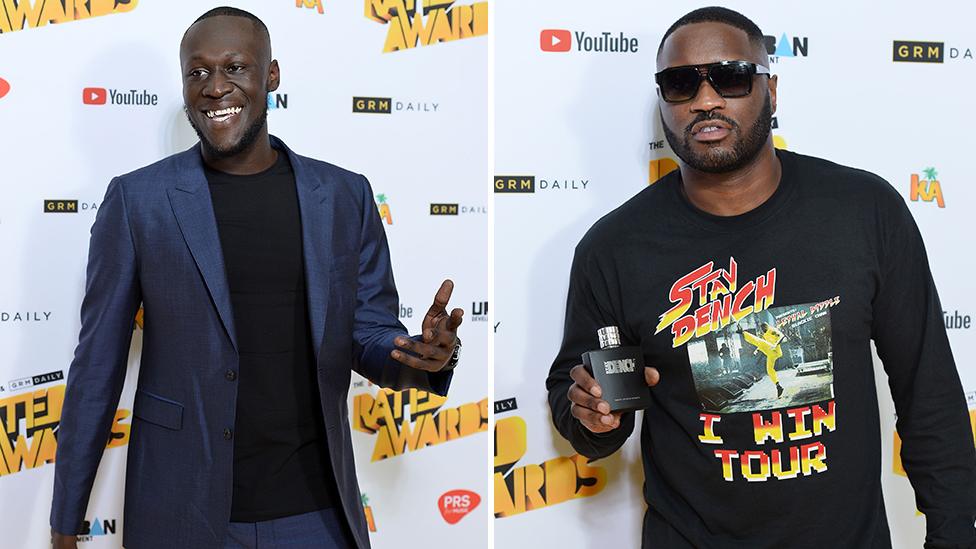The track that caused so much chaos on the dancefloor it got banned
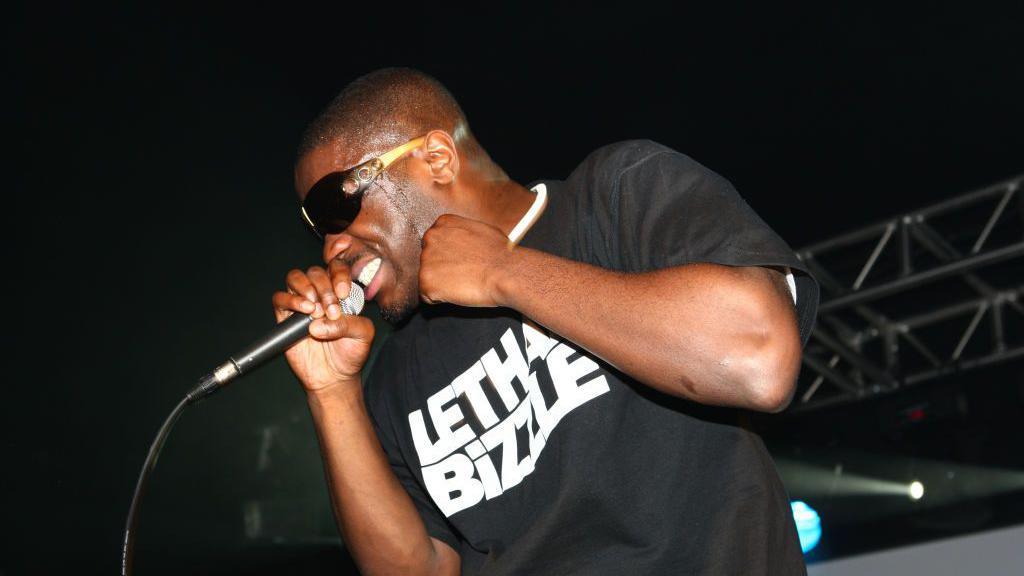
Lethal Bizzle said DJs would send him pictures of signs in clubs telling them not to play Pow!
- Published
“The reaction was so crazy. I’ve never seen a song reaction like that in the club,” Lethal Bizzle tells the BBC.
Every time the grime artist’s debut single Pow! blasted through speakers in UK nightclubs in the early 2000s, there was chaos on the dancefloor.
Adrenaline-fuelled clubbers pushed and slammed into one another. Drinks flew across packed, sweaty venues, late into the night.
“Basically it was people having fun mosh-pitting - very normal at festivals - but in the club environments that I was used to playing, that never used to happen then,” Bizzle says.
“A lot of the club owners were like: woah, woah, woah, what’s going on here!”
The three-minute barrage of energy, which starts with Bizzle before the microphone is passed between 10 MCs, became so notorious that clubs banned it across the country.
Signs in DJ booths started appearing, reading: “All Lethal B tracks are banned from this venue (including instrumentals).”
In a sign of how repressed it was, it was never actually performed live with all of the MCs together.
That is about to change, two decades after the track’s release, as Bizzle and the entire crew are set to perform Pow! at London’s Roundhouse this December.
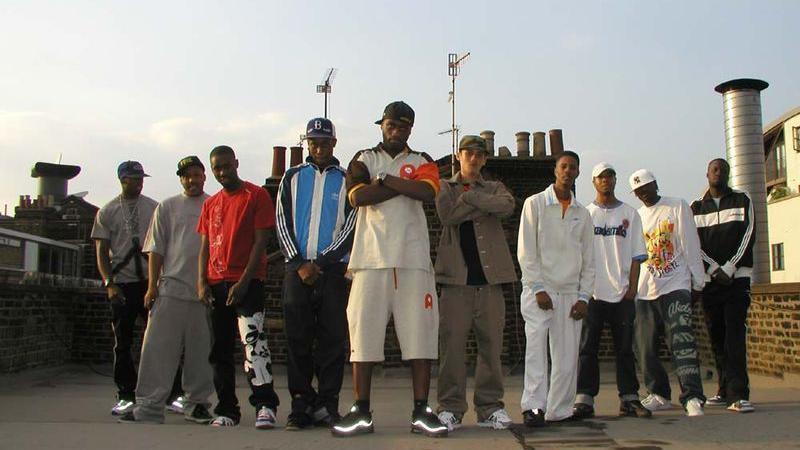
Pow! featured 10 MCs rapping on a beat selected by Bizzle - though not all were convinced at the start
It’s a surreal twist for the rapper that would have been unimaginable in 2004, when he crafted the piece.
Pow! was a track born out of frustration with the music industry.
Major labels weren’t investing in grime - despite hopes they would after Dizzee Rascal's debut record Boy In Da Corner took off the previous year.
“Dizzee was having an amazing time - he won the Mercury [Music Prize] and that gave us a bit of hope. It was like ‘yes, they’re signing artists again’,” says Bizzle.
“Nothing happened. It was only Dizzee. The rest of us were back on pirate radio.”
But London’s pirate radio stations were where Pow! was whipping up a frenzy, even before it was released on iTunes.
And it’s where Bizzle honed his craft, clashing with other MCs on the airwaves.
With Pow! he wanted to “create the vibe of pirate radio on a song”.
“When we’d be in the studio it’d just be constant energy. Everyone is spitting their bars, everyone is just going crazy. I was like: ‘I don’t think that’s happened on a song before.’”
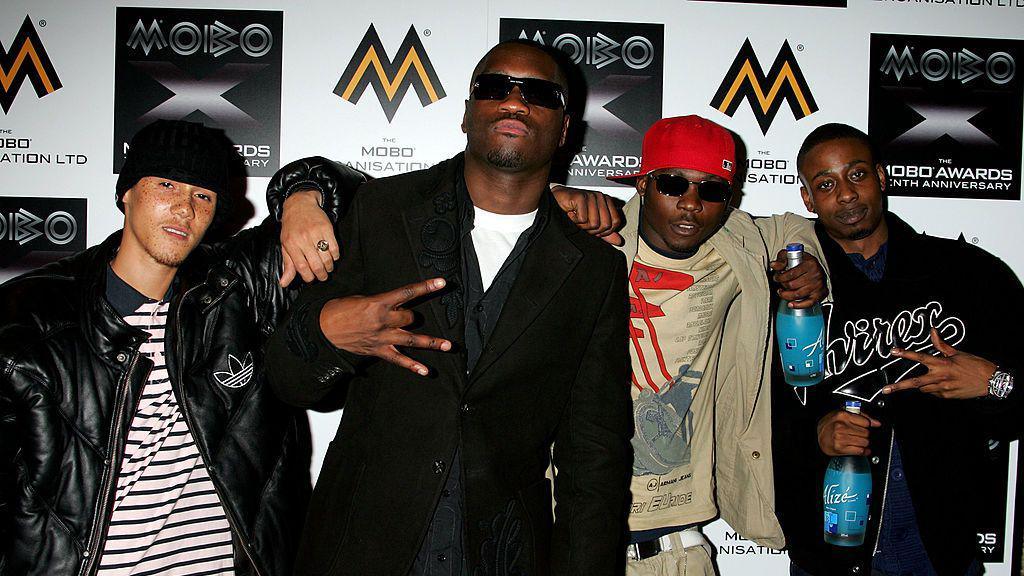
Lethal Bizzle, second left, joined some of the other MCs at the Mobo Awards in 2005 where Pow! won best single
Bizzle started hunting for beats and putting calls into his favourite underground MCs.
He eventually managed to gather 10 of them in a room to record the single including D Double E, Flowdan and Jamakabi.
He played the beat he’d chosen - but most of them weren’t too keen.
“I was like hyping it up, being like ‘bro wait till you hear this beat, it’s gonna blow your mind’.
“I played the beat - no word of a lie - 80% of the MCs were looking like, ’huh? What is this?’”
D Double E remembers that he wasn’t blown away at first. “It weren’t like it was rubbish… I just remember not really feeling the vibe,” he tells the BBC.
After a rallying cry in the studio, which Bizzle likens to Sir Alex Ferguson at half-time in a Champions League final, the other MCs reluctantly agreed to record their verses. When they listened back, their opinion started to shift.
“When I heard the bar I just knew that I'd killed the beat,” says D Double E.
It didn’t take long for Pow! to take off on pirate radio and Channel U, which was dedicated to UK underground urban music. By December, it entered the top 40 at number 11. The following year it won the Mobo award for best single.
The labels started calling and shows started getting booked.
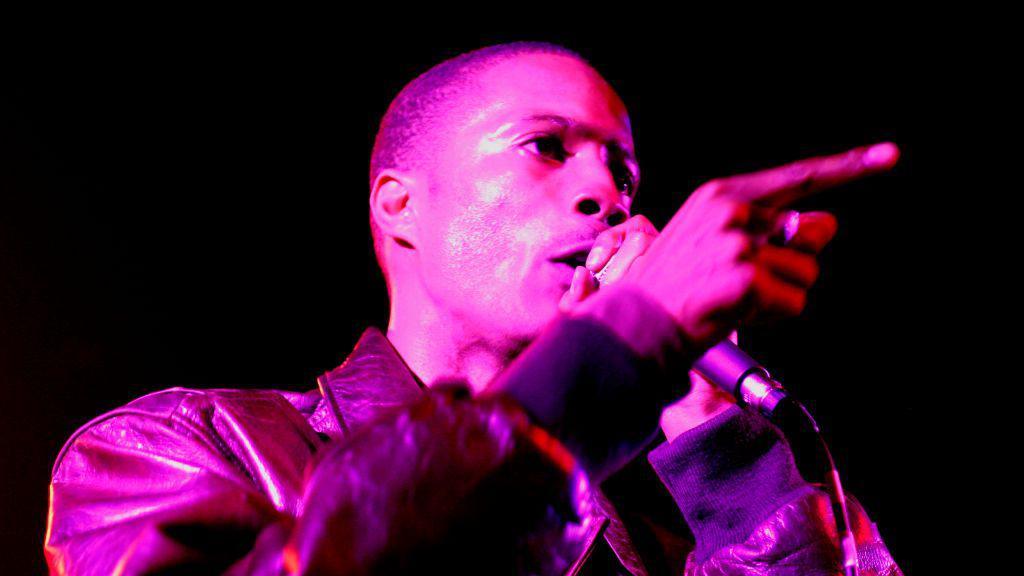
D Double E wasn't sold on the beat used for Pow! at first but was won over after hearing the finished version
What led to the song being banned in clubs isn’t fully clear - but Bizzle thinks a fight broke out when Pow! was played at one venue, and the news spread. It happened again, and again.
DJs started sending him photos of signs in booths warning them to not play the track.
Then some of his shows even started getting pulled, including one in Leicester after police warned that the club could lose its live licence if it was allowed to go ahead, Bizzle recalls.
“Then I was like this is actually really serious, actually getting out of hand.”
At the time clubs in London were required to fill out a form when hosting events with DJs and MCs. It included the question "is there a particular ethnic group attending?" - which was dogged by accusations of racism.
Police said it curbed gun crime at clubs and played a role in reducing serious violence – but even though the ethnicity clause was removed in 2008, the form targeted a disproportionate number of events by black and Asian artists and was eventually retired.
Bizzle remembers how efforts to suppress his music started falling away after top music magazine NME compared Pow! to Sex Pistols’ God Save the Queen.
"Once in a generation, a record comes along that causes people to sit bolt upright, a rallying cry to the masses, a barometer of social discontent that turns venues into mosh-crazed riots,” the review read.
Festivals then started booking Bizzle and he played packed out shows at Reading & Leeds.
Jay-Z rapped over the Pow! instrumental. There were even discussions about the US superstar featuring on an official remix of the song.
Memphis Bleek, a rapper close to Jay-Z, confirmed on a podcast this year that a version was recorded but never released.
By 2010, the song was making waves on the streets of London again.
Tens of thousands of students were protesting against an increase of the cap on tuition fees. On 10 December, just a stone’s throw from Big Ben, a sound system was set up and protesters started playing Pow! The crowd went wild.
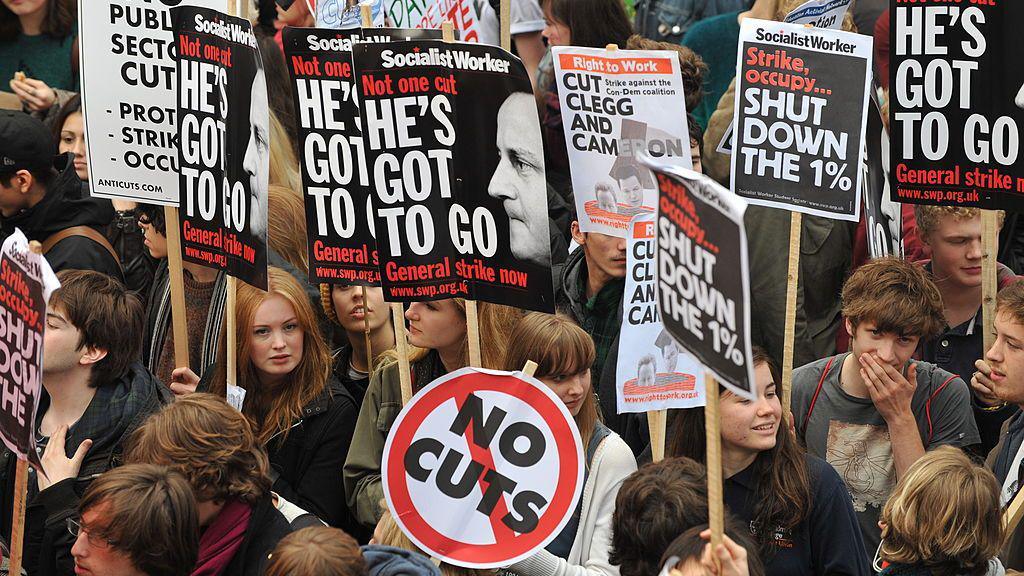
Pow! became part of the soundtrack to the 2010 student protests in London
Bizzle says he was proud when he saw the footage.
“We had an understanding. I made Pow! because I was almost fighting against what was happening with the police and the industry trying to shut us down,” he says.
“It was a similar message with the students, I was glad to see it used in the way that I made it. That was the perfect backing track for that moment.”
Bizzle says the inspiration behind this December's show, which will celebrate 20 years of Pow!, came from an unlikely source.
“It’s so random. Last year I was chilling watching Netflix and I saw the Robbie Williams documentary,” Bizzle says.
Inspired by Williams' reunion with the other members of Take That, Bizzle thought it was time for him to do the same.
“I was sitting there thinking, I do miss the boys man.”
Some of the Pow! MCs have moved on from music, including Napper who is a boxing promoter and manages Chris Eubank Jr, but everyone will be on stage on 1 December alongside special guests, including Roll Deep.
“Everybody drifted off to other walks of life, but the main thing is that everyone is still alive and healthy,” Bizzle says.
“When the show happens it’s gonna be emotional, man - 20 years on and seeing how people respond to the song like it just came out today.
“We’ve got to give the people what they want and what they missed.”

Revealed: The true story behind Jay Z's guest verse on Pow! by Lethal Bizzle
Over 45 minutes Lethal Bizzle and Radio 1's Target chatted everything from 90s drum'n'bass, East London, More Fire Crew and meeting the rappers that inspired him.
He also revealed the true story behind Jay Z's involvement in his iconic (and controversial) track Pow! following a performance at the Royal Albert Hall.
- Published13 November 2023
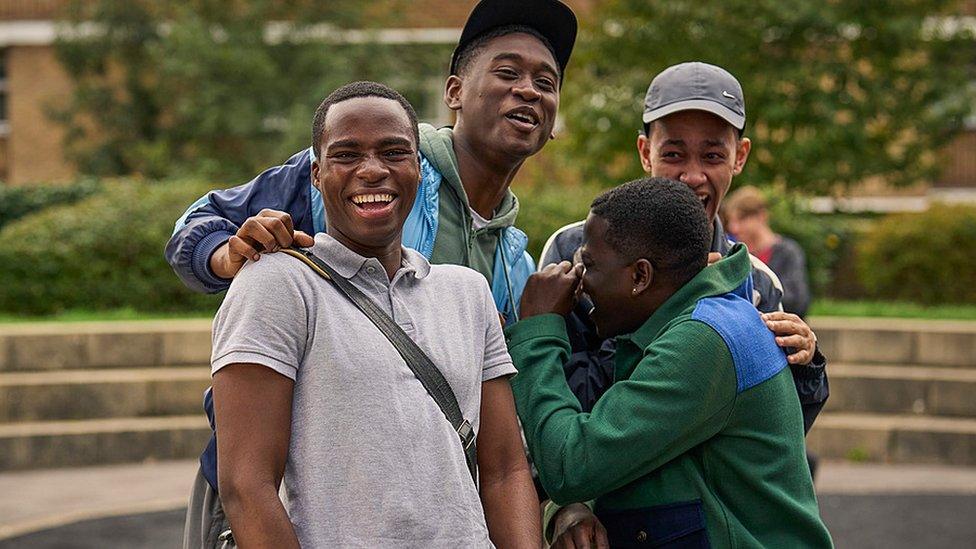
- Published6 October 2017
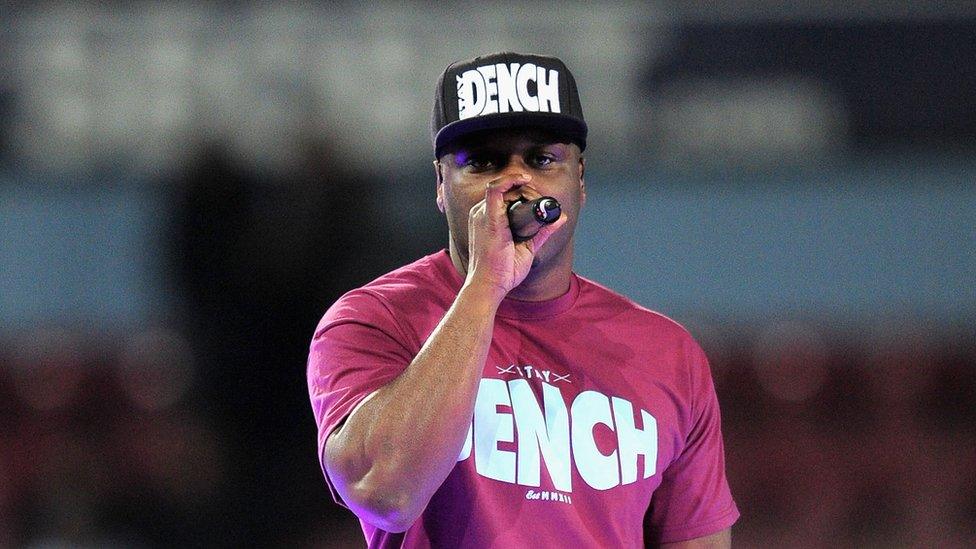
- Published25 October 2017
